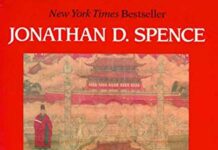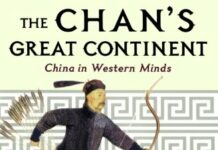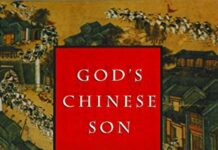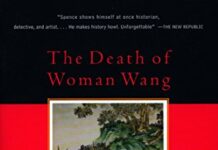
Ebook Info
- Published: 2011
- Number of pages: 209 pages
- Format: PDF
- File Size: 1.40 MB
- Authors: Jonathan D. Spence
Description
This lively and elegant book by the acclaimed historian Jonathan D. Spence reconstructs an extraordinary episode in the early intercourse between Europe and China. It is the story of John Hu, a lowly but devout Chinese Catholic, who in 1722 accompanied a Jesuit missionary on a journey to France–a journey that ended with Hu’s confinement in a lunatic asylum. At once a triumph of historical detective work and a gripping narrative, The Question of Hu deftly probes the collision of tw ocultures, with their different definitions of faith, madness, and moral obligation.
User’s Reviews
Reviews from Amazon users which were colected at the time this book was published on the website:
⭐The Question of Hu, written beautifully by Jonathan Spence, should be considered an important contribution to the broad field of humanities. However, the question remains if Spence’s research fits within the strict confines of historical literature, or whether its narrative-driven style is more characteristic of a historical novel. Spence’s tale about the travels of Jean-Francois Foucquet, a Jesuit priest, and his culture-shocked Chinese copyist, John Hu, blurs the line that arbitrarily divides the various fields that constitute the humanities. While The Question of Hu seemingly lacks the detached analysis that most historians infuse into their works, Spence’s tale, nonetheless, has to be considered an imaginative and exciting contribution to historical literature, which in its own subtle style, provides a platform for criticizing European cultural chauvinism during the 18th centuryThroughout his work, Spence efficiently uses proven literary devices to speed along the story and provide a sense of suspense for the reader. Spence begins in medias res with Hu- a Chinese copyist -being visited by a concerned Jesuit clergyman. The two years that Hu had spent within a French insane asylum, after being abandoned by his own employer, proved harsh; even leaving one clergyman to comment that Hu looked like an “exhumed corpse” (Spence, 6). From this literary hook, Spence expertly details how Hu, who faithfully traveled with his employer on a ship from China to France, had met this unfortunate end. Unlike most histories, where the author’s thesis is clearly stated and the sequence of events is laid out completely within the introductory pages of a book, Spence merely explains that he didn’t, “think Foucquet [Hu’s French employer] was right in the way he treated Hu,” (Spence, XX). In this, Spence’s analysis seems weak and undeveloped. But this is misleading. Spence’s slight touch allows the audience’s to read further into the seemingly truthful narrative that Foucquet has set aside, and for which Spence has neatly organized into an excellent historical narrative.The argument against The Question of Hu being considered a truly historical work lies in the belief that Spence avoids providing a detailed analysis about the themes that could be gleaned from Hu’s experiences. Of these themes, the perception that European Christian practices were superior to Chinese traditions, can be seen throughout the text. Spence, while not obnoxiously moralistic in his criticism, does open the door for judgments against the actions of Foucquet. With a close examination of Spence’s narrative it can been understood that Foucquet’s racially demeaning relationship with Hu serves as an example of cultural arrogance that pervaded European Christian thought during the 18th century . Was Hu’s eccentric behavior in France, in which he stole a horse, ran away on several occasions, and led an outwardly misogynistic parade through Paris, proof of his insanity? Or merely the frustrated reactions of pious albeit eccentric man completely overwhelmed by his experiences within cosmopolitan France; detached from his conservative Chinese heritage; and all the while, handicapped by his inability to speak French. To attribute Hu’s behavior to sudden bout of insanity detaches Foucquet of any responsibility of handling complex cultural relations between his Chinese employee and his own European culture, thus leaving his self-serving theological systems untouched by the sting of reality. Foucquet’s believes that “the Chinese lack the key to their own classical writings,” and that Christianity is the only way for them to truly understand their own cultural traditions. Even the intensely pious Hu, who attempted to attain Christian salvation by denouncing his wealth and possessions, was characterized by Foucquet as being a lunatic, because his expressions of Christian faith were considered primitive and ritualistic.It is not historically responsible to attribute the actions of one man as an example of a whole society, as can be seen with the few Jesuit clergymen who were concerned with plight of Hu. However, to deny that Foucquet’s actions were not a function of broad European historical mechanisms that influenced his belief systems, and thus predicted his egregious decision to abandon Hu, would be just as irresponsible intellectually. Spence’s concise but brilliant history subtly examines the complex relationship between European Christian ideology and Chinese cultural practices. At only 134 pages, The Question of Hu, does not contain a preaching condemnation of European cultural chauvinism, but quiet judgment can be gleaned from Spence’s tactful source analysis.
⭐I am still debating whether I am glad I read it or not. Luckily it was short.
⭐Chinese history has always fascinated me! Even though this book was assigned to me in college I enjoyed every minute!
⭐Arrived right on time and great quality for a good price. Will come back again for more books. Thanks alot.
⭐I’m sure for the avid reader, this book is good. But we used it in a History 15000 report. I could’ve found 50 books to choose for a college History paper to write on.
⭐It was an ok book, I really didn’t grasp the meaning but it was for my history class so there you go!
⭐The Question of Hu is historian Jonathan Spence’s reconstruction of the real-life saga concerning a Chinese man named Hu. In the 1720s, Hu traveled to France as an employed servant of his Jesuit master, Jean Francois Focquet, who later renders his accounts of Hu into writing. Hu began to exhibit strange behavior on the ship’s voyage to France, demonstrating an alarming incorrigibility that escalated after his arrival in Europe. Becoming unmanageable, he was thrown into an insane asylum for two years. Why? What happened to put a previously normal appearing man in the madhouse? And why was he later released to return to China as a respectable man, compensated monetarily for what he perceived as a great injustice? Spence tells Hu’s story with an engaging, entertaining, and intriguing touch. This fairly short book is easy to read, a good story that will hold a reader’s interest.
⭐If you enjoyed “The Professor and the Madman”, this book might just be your cup of tea. In both books, the central character becomes schizophrenic. In “The Professor and the Madman”, he’s an American officer in London. In “The Question of Hu”, he’s an assistant to a Jesuit scholar in France. This is a comparatively thin book, but it contains many threads: infighting among Jesuits, the Catholic missionary strategy in China in the 18th century, culture shock, treatment of the mentally ill, fidelity, circumstances in 18th century Paris and Canton, and careerism, among others. This is an engaging story well told.
⭐I love how this book was written. It was very easy to read, because it seemed like a historic fiction novel. However, no opinion was provided, the historical evidence was stated and that was all.
⭐Got it
⭐Hu seems to be a Chinese man with poor education wanting to see the Rome and thinks he has found a good way to do it and get paid for it by a French priest. The French priest is an idiot whith complete insane theories about chinese rites and christianism and te entire story needs to be set in the discussion about the Chinese rites used by the jesuits to be succesful in their China mission (a fact poorly explained in the book). The pope eventually banned the chinese rites after years of controversy. Set in this ideological battle the French scholar/priest has acquired an enormous library of Chinese books (partly by ruse and paid for by librarians in Europe). It is never clear if he wants to sell the collection in Europe or just uses librarians to get them through customs. the priest uses his stature to get the crew to use part of the space for their pacotille etc to transport his books. The book smuggling goes wrong and a nightmare for the priest starts. Bringing a chinese copiist to Europe seemed a good help and a stunt to publicize his work, but Hu is no scholar and not even a good copiist, but he’s the best he could get and the next to nothing option. Chinese are kind of en vogue and appear on clocks, furniture etc. Hu who doesn’t speak french and never will during his years in France relies on the few French that speak Kantonese. His erratic behaviour is considered insane and he’s put in an asylum. The book uses official records and an apology written by the French priest. We never get the full story and will never get Hu’s side of the story, but after his return to China Hu becomes somewhat of a local celebrity earning money for being paid telling about his travels to the exotic France.
Keywords
Free Download The Question of Hu in PDF format
The Question of Hu PDF Free Download
Download The Question of Hu 2011 PDF Free
The Question of Hu 2011 PDF Free Download
Download The Question of Hu PDF
Free Download Ebook The Question of Hu




